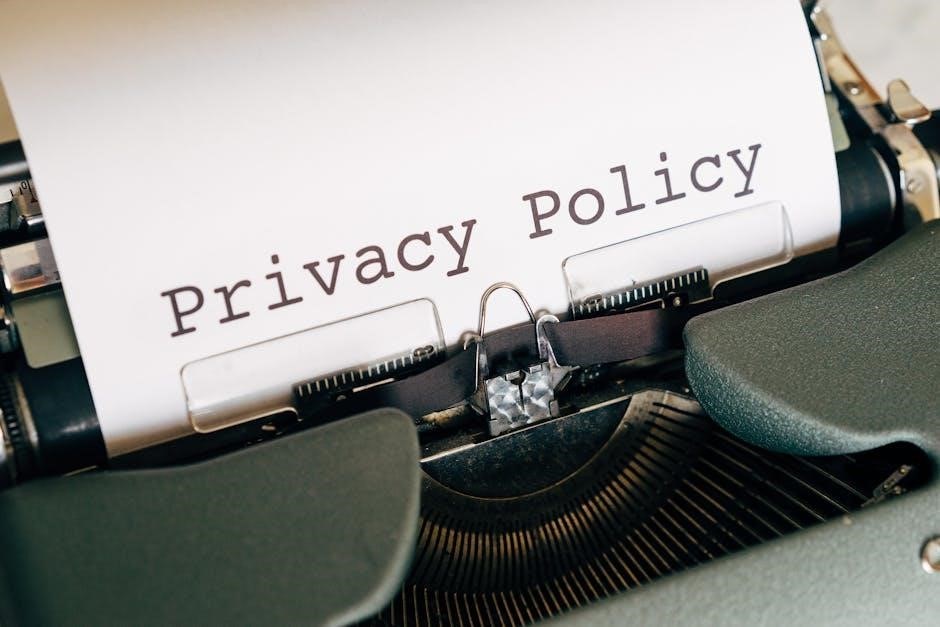Chapter 7 of the Medicare Benefit Policy Manual provides comprehensive guidance on home health services, including coverage, payment, and documentation requirements, ensuring clarity for providers and beneficiaries.
Overview of the Medicare Benefit Policy Manual
The Medicare Benefit Policy Manual, published by the Centers for Medicare & Medicaid Services (CMS), serves as a key resource for understanding Medicare policies and guidelines. It is divided into chapters, each addressing specific aspects of Medicare benefits. Chapter 7 focuses on home health services, providing detailed guidance for providers. The manual outlines eligibility criteria, coverage conditions, and documentation requirements. It also clarifies payment and billing processes under the Home Health Prospective Payment System (PPS). Regular updates ensure the manual reflects current regulations and clinical practices. This resource is essential for healthcare providers, certifying physicians, and billing specialists to ensure compliance with Medicare requirements and deliver appropriate care to beneficiaries.
Importance of Chapter 7 in Home Health Services
Chapter 7 of the Medicare Benefit Policy Manual is crucial for understanding home health services under Medicare. It provides detailed guidance on coverage, documentation, and payment requirements, ensuring providers comply with regulations. This chapter is essential for certifying physicians, home health agencies, and billing specialists to navigate Medicare policies effectively. By outlining the homebound requirement, medical necessity, and certification processes, it helps ensure that beneficiaries receive appropriate and cost-effective care. Updates to Chapter 7 reflect evolving healthcare practices, making it a vital resource for staying current with Medicare guidelines and delivering high-quality home health services while maintaining adherence to federal standards and patient care priorities.

Home Health Services Under Medicare
Medicare covers home health services, including skilled nursing and therapy, under specific conditions outlined in Chapter 7, ensuring beneficiaries receive necessary care in their homes efficiently.
Definition and Scope of Home Health Services
Home health services under Medicare are defined as medically necessary care provided in a patient’s home, including skilled nursing, physical, occupational, and speech therapy, and medical supplies. These services are designed for beneficiaries who require intermittent or part-time care. The scope includes services ordered by a physician to treat or manage a medical condition, ensuring patients receive care in a home setting rather than in an institutional facility. This care is tailored to promote recovery, maintain health, or prevent deterioration, aligning with Medicare’s goal of delivering cost-effective, patient-centered care in the most appropriate setting.
Eligibility Criteria for Home Health Benefits
To qualify for Medicare home health benefits, beneficiaries must meet specific criteria. They must be under the care of a physician, require intermittent skilled care, and be homebound, meaning leaving home is difficult without assistance. The homebound condition is central to eligibility, though occasional outings for medical care or religious services are permitted. Additionally, the services must be ordered by a physician and provided by a Medicare-certified home health agency. The care must be part-time or intermittent, not full-time, and tailored to treat or manage a medical condition. These criteria ensure that home health services are used appropriately and effectively for eligible beneficiaries.

Conditions for Medicare Coverage of Home Health Services
Medicare covers home health services if beneficiaries are homebound and require medical care. Certification by a physician is essential, ensuring services are medically necessary and appropriate.
The Homebound Requirement
The homebound requirement is a critical condition for Medicare coverage of home health services. Patients must be confined to their home due to a medical condition, with leaving home requiring significant effort or assistance. This requirement ensures services are provided in a setting appropriate for the patient’s condition. The homebound status must be certified by a physician, aligning with Medicare’s guidelines to prevent unnecessary institutionalization. Failure to meet this criterion results in denial of coverage, emphasizing the importance of accurate documentation and certification. This requirement is detailed in Chapter 7, Section 30.1.1, of the Medicare Benefit Policy Manual.
Medical Necessity and Certification by a Physician
Medical necessity is a cornerstone of Medicare coverage for home health services, requiring a physician’s certification that the services are essential for treating the patient’s condition. The physician must document the specific medical needs and how home health services will address them effectively. Certification involves confirming the patient’s homebound status and outlining the required care, such as skilled nursing or therapy. This certification ensures that services are medically appropriate and aligned with the patient’s recovery goals. Accurate and thorough documentation by the physician is critical to validate the medical necessity and justify Medicare coverage, as detailed in Chapter 7 of the Medicare Benefit Policy Manual.
Documentation Requirements
Accurate and detailed medical records are essential, ensuring compliance with Medicare guidelines and verifying the necessity of home health services, as outlined in Chapter 7.
Medical Record Documentation Guidelines
Medical records must include detailed patient assessments, treatment plans, and progress notes to justify home health services. Documentation should clearly outline the patient’s condition, treatment goals, and outcomes. Accurate records ensure compliance with Medicare requirements and validate the necessity of care. Specific elements such as physician certifications, therapy logs, and skilled interventions must be thoroughly documented. These records serve as the foundation for billing and audits, ensuring proper payment and adherence to regulations. Non-compliance with documentation standards may result in denied claims or reimbursement issues. Therefore, precise and comprehensive documentation is critical for providers to maintain integrity and meet Medicare’s guidelines effectively.
Scope of Practice and Practitioner Relationships
Documentation must outline the scope of practice for all practitioners involved in home health care, ensuring services are provided within their legal and professional boundaries. Practitioner relationships to the ordering physician must be clearly defined to validate the coordination of care. This includes specifying how practitioners communicate with physicians and contribute to patient care plans. Proper documentation ensures that home health services are medically necessary and align with the physician’s orders. Failure to document these relationships and roles may result in denied claims or compliance issues. Clear records help establish accountability and facilitate effective care coordination, adhering to Medicare’s requirements for home health services.

Physician Certification and Recertification
Physician certification is required to establish medical necessity for home health services, with recertification needed at specified intervals to ensure ongoing eligibility and appropriate care continuation under Medicare guidelines.
Initial Certification Requirements
Initial certification requires a physician to confirm a beneficiary’s need for home health services, ensuring medical necessity and homebound status. The certification must include a face-to-face encounter, documenting the patient’s condition, care plan, and reasons for homebound status. The certifying physician must be the beneficiary’s treating physician or have a direct role in their care. The certification is valid for 60 days and must be submitted to the home health agency (HHA) within the required timeframe. Failure to meet these requirements may result in denied claims. This step ensures services are medically necessary and aligned with Medicare coverage guidelines, maintaining program integrity and beneficiary access to care.
Recertification Process and Timeframes
Recertification is required when a patient’s home health care extends beyond the initial 60-day certification period. The certifying physician must reaffirm the patient’s eligibility, including homebound status and medical necessity, at least every 60 days. The recertification process mirrors the initial certification, requiring updated clinical information and a face-to-face encounter if applicable. Home health agencies (HHAs) must submit recertification documentation within the prescribed timeframes to avoid payment denials. CMS guidelines outline specific requirements for timing and documentation to ensure continuity of care and compliance with Medicare regulations. Proper adherence to these timeframes and processes ensures uninterrupted beneficiary access to necessary home health services. Accurate and timely recertification is essential for maintaining payment and program integrity.

Payment and Billing for Home Health Services
Medicare pays home health services through the Prospective Payment System (PPS), determining rates based on patient assessments and care needs, with specific billing guidelines outlined in Chapter 7.
Prospective Payment System (PPS) for Home Health
The Prospective Payment System (PPS) for home health services is a payment model where Medicare reimburses home health agencies (HHAs) a fixed amount per patient episode. This amount is determined based on patient assessments, clinical conditions, and functional limitations, ensuring that payments align with the intensity of care required. The PPS system promotes efficient and cost-effective care delivery by rewarding providers for managing resources effectively. Chapter 7 of the Medicare Benefit Policy Manual provides detailed guidelines on how the PPS works, including the calculation of payment rates and the adjustments made for specific patient needs. This system helps maintain consistency in Medicare payments for home health services nationwide.
Documentation Requirements for Billing
Accurate and comprehensive documentation is essential for billing home health services under Medicare. The Medicare Benefit Policy Manual, Chapter 7, outlines specific requirements for documentation to support claims. This includes detailed records of the patient’s plan of care, certification by a physician, and evidence of medical necessity. Documentation must also reflect the scope of services provided, such as skilled nursing care, therapy, and medical supplies. Updates to Chapter 7 emphasize the importance of clear and concise records to ensure compliance with billing guidelines. Proper documentation helps prevent reimbursement issues and ensures that providers meet CMS standards for home health care billing.
Updates and Clarifications in Chapter 7
Chapter 7 has been updated to reflect changes in documentation requirements and physician certification processes, ensuring compliance with current Medicare home health care standards and policies.
Recent Revisions and Their Impact
Recent revisions to Chapter 7 of the Medicare Benefit Policy Manual have clarified requirements for physician certification and documentation of home health services; Change Request 9119 updated Section 30.5.1, emphasizing the need for detailed documentation of a patient’s medical condition and the necessity of home health care. Additionally, the manual now requires clear documentation of practitioners’ relationships with certifying physicians, ensuring compliance with scope of practice guidelines. These changes aim to reduce discrepancies in billing and improve the accuracy of claims under the Home Health Prospective Payment System. Providers must adapt to these updates to maintain proper reimbursement and avoid regulatory issues.
Guidance on Specific Billing Codes and Procedures
Chapter 7 provides detailed guidance on specific billing codes and procedures for home health services under the Medicare program. It includes crosswalks to help providers transition between old and new billing codes, ensuring accurate claims submission. The manual specifies valid billing codes for various services, such as skilled nursing and therapy visits, and outlines proper documentation practices to support these codes. Additionally, it clarifies the use of modifiers and billing frequencies, reducing the risk of denied claims. Updates to this section reflect changes in payment systems and coding requirements, ensuring compliance with the Home Health Prospective Payment System and other regulatory standards. This section is essential for accurate and efficient billing processes.
